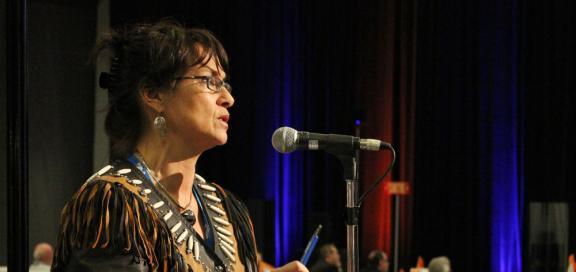Wednesday at the Canadian Labour Congress Convention centred around bringing the benefits of unions to people who don’t currently have access: unorganized workers, particularly young workers, racialized workers, migrant workers, women, and people with disabilities.
On a morning panel, “The Labour Movement is About a Better Life for Everyone”, activists from other organizations talked about labour’s ability to make positive change for everyone.
Acting General Secretary of the Bangladesh Free Trade Union Congress Repon Chowdhury talked about the positive impact of the union-driven Accord on Fire and Building Safety in Bangladesh.
“We must work together and the Accord is one of the best things around the world that we have, from trade unions working together,” Chowdhury said. But he also noted there are companies that have not signed on, and he urged Canadians to pressure companies who have not yet signed the accord.
Vice-President of the Canadian Association of Retired Persons (CARP) Susan Eng said they rarely use their organization’s full name anymore, “because so few of our members can afford to retire.”
She thanked the labour movement for leading the drive to expand the Canada Pension Plan, even though many union members have workplace pensions: “The key is that we put our shoulder to the wheel, even when it doesn’t benefit our organizations.”
She advised unions to join with allies and to focus their efforts on one thing at a time: “The need is to mobilize, to concentrate, to get that specific thing done first, even if you have ten other things you must do, you must do this one thing first.”
Finally, Anthony Pizzino from the Occupational Health Clinics for Ontario Workers said a key role unions can play is helping raise awareness of issues that affect all working people.
“In Canada…five workers a day don’t come home,” he said, adding that Canadians most aware of the shocking numbers of workplace injuries and deaths.
Another afternoon panel, “Bringing the Union Advantage to Those Who Need it Most”, had labour academics and activists talk about helping unorganized workers to join unions.
Brock University Labour Studies Professor Dr. Kendra Coulter (right) began by talking about how unions can reach out to people to show how important they are to a fair society.
Coulter said we need to look to countries like Sweden that have high union density, which came about because “workers in the past collaborated, not just in solidarity at work but also a sense of social solidarity, which is that we all do better when things are fair at work.”
“We need to reclaim [job creation] as a workers’ agenda and creating good jobs,” Coulter said.
Acting Director of the AFL-CIO Department of Investment, Brandon Rees, said unions have to work globally, because the growing inequality we see in Canada is growing in the rest of the world too.
“The challenge is that capital is global and corporations are increasingly global…that means that we too must be organizing on a global scale to address these economic challenges that globalization presents,” said Rees.
Next, AFL-CIO Organizer Chloe Osmer talked specifically about how we need to change strategies to organize in the service-based economy, with the proliferation of precarious work.
“The lack of regulation, the shift to a service sector has made it more challenging to organize but it has also given us a lot of opportunities,” Osmer said.
Osmer talked about her experience organizing car wash workers in Los Angeles, and how it was important to mobilize younger organizers and students.
“We have to use every tool that we can to turn people’s public perceptions of unions around, because most people you’ll run into in the workplace haven’t had the experience of being in a union. They don’t know what the reality of the situation is. The more that young people are reflected in our unions and the way we operate and our organizers the more young people will see it’s about them.”
During the day delegates to convention debated several resolutions. In the morning, delegates passed a resolution on mental health, one opposing the end of Canada Post home mail delivery, and another committing the Canadian Labour Congress to developing an educational module on violence against women and other steps on this issue, including supporting a federal inquiry into missing and murdered Aboriginal women and the creation of a national action plan on violence against women.
In the afternoon the convention passed the final convention policy paper “Organizing for a Fairer Tomorrow” and passed more resolutions, including one on labour rights and another directing the CLC to develop a national young workers’ strategy, including opportunities for young workers in the workforce and the labour movement.
Near the end of the day MoveUP Human Rights Committee Chair and Executive Board Member Joyce Galuska spoke on a resolution on human rights. She wanted to particularly highlight the issue of missing and murdered indigenous women.
“I’m kind of sad to be standing here three years after the last conference knowing my CLC hasn’t been bold enough to fight this issue,” Galuska said. She thanked MoveUP for their campaign, which allows members to send messages to Harper in support of justice for these women.
“I want to inundate the Harper government with a mountain of shame letters because I wanted the CLC to encourage every one of their affiliates to write to Stephen Harper, either by creating their own campaign or joining the Amnesty International Stolen Sisters campaign.”



